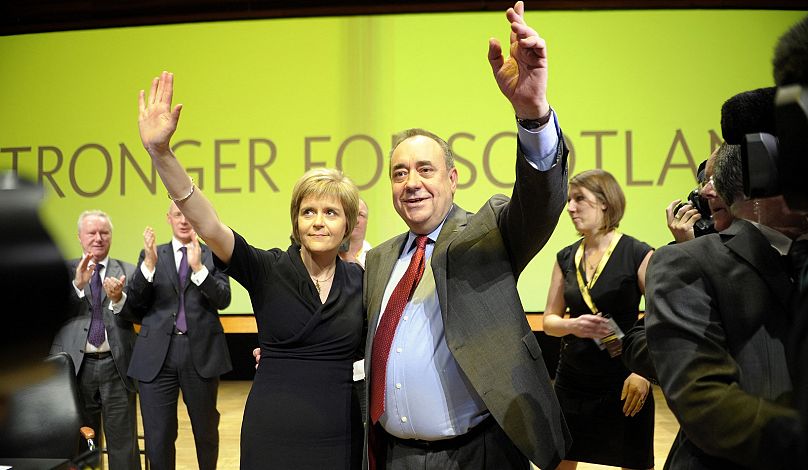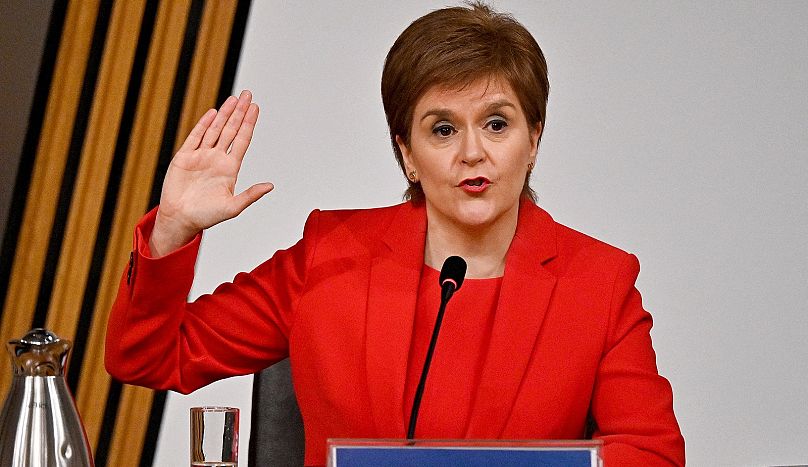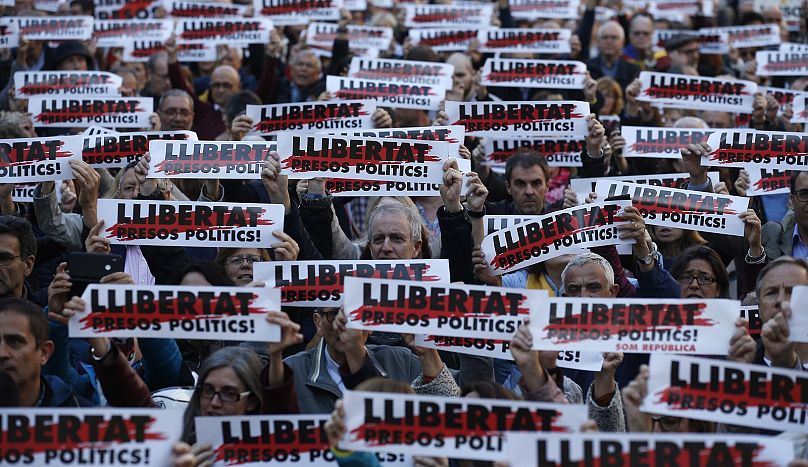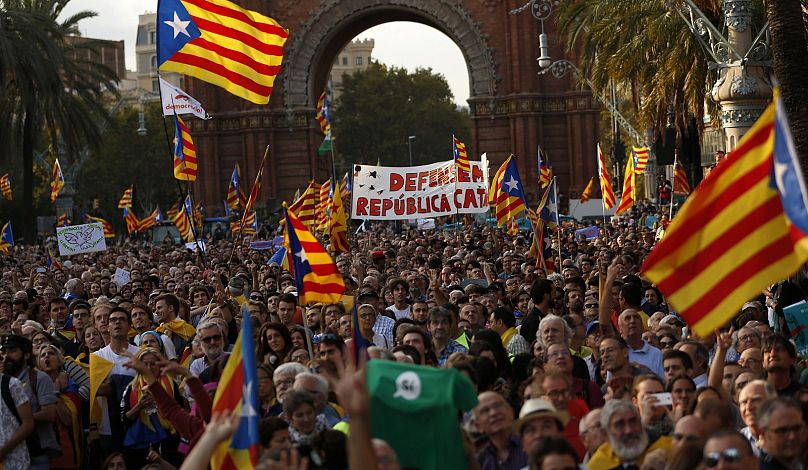2021 is set to be a pivotal year in the independence movements in Scotland and Catalonia. But are there lessons each movement can learn from the other to avoid the pitfalls that threaten to derail their cause?
The Saltire and the Estelada flags are almost always found together at marches in support of independence, be they down the Royal Mile, Edinburgh's medieval thoroughfare, or along Barcelona's tree-lined boulevard Las Ramblas.
 ADVERTISEMENT
ADVERTISEMENT
 ADVERTISEMENT
ADVERTISEMENT
Such is the camaraderie between the two movements that comparisons between Scotland and Catalonia's drive to determine their own national destinies abound with proponents from each drawing succour from the other's struggle.
On Tuesday ex-Catalan leader Carles Puigdemont told Euronews as much. admitting he supported all movements for self-determination across Europe. "In the United Kingdom, the case of Scotland is very inspiring us," he said.
This year will be a consequential year for both movements.
Elections in Scotland and Catalonia hold the key to their future success. But political scandals, party in-fighting, and diametrically opposed views on how best to achieve the reality of self-determination are threatening to derail their momentum.
But could lessons learned by both movements help the other avoid further tribulations and set them back on an even keel?
Internal strife
Having lost the 2014 referendum on Scottish independence, the Scottish National Party (SNP) has worked ferociously in the ensuing years to shore up the support it won nearly seven years ago and keep the question of Scotland's place in the UK at the fore of the political agenda.
And yet, despite being on the cusp of a historic fourth consecutive election win, and having succeeded in making independence the current prevailing choice among Scots, the SNP look increasingly bedraggled; bruised not from their near 14 years in power but by party in-fighting.
Coming to the fore in recent months, a public war of words among the rank and file has broken out over issues such as the Gender Recognition Act reform - which has pitted trans and women's rights advocates in the party, including frontline politicians, against each other - and whether to support former leader Alex Salmond, who was acquitted in 2020 of charges of sexual assault that were alleged to have taken place during his tenure as first minister.
It's a watershed moment for a well-oiled political machine that has long ensured a unity of purpose among its membership through a strict code of conduct designed to prevent disloyalty to the party or dissent to its aims.
"I neither think that the previous unity and top-down control, nor the current divisions are very healthy," Scottish political commentator Kirsty Hughes, the former director of Scottish Centre on European Relations (SCER), told Euronews.
"I think it's fine to have a healthy debate about trans rights and women's rights, but I don't think that's what's happening. And why is it centre stage? You know, where are the typical party conflicts over economic policy or left or right?" she added.
"We want to have a debate over independence and should we be able to rejoin the EU or the European economic area.
"It doesn't look very healthy politically".
Salmond's revenge
Differing ideological standpoints on party policy aside, it's the feud between Salmond and his former protégé, however, that is likely to cause the most collateral damage to the SNP and the independence cause with popular leader Nicola Sturgeon now fending off allegations that she misled the Scottish Parliament over her administration's handling of the investigation into her former boss' alleged wrongdoing.
Salmond has accused his successor, former ally, and close friend - as well as other senior figures in the SNP and the Scottish government - of being involved in a "deliberate, prolonged, malicious and concerted effort" to tarnish his reputation to the point that he could have been jailed.
In the wake of the trial, an independent inquiry was set up to review the case after the Scottish government admitted the internal investigation into complaints against Salmond - which led to over £600,000 of taxpayers' money being spent on both parties' legal costs - was "unlawful".
Having appeared before the inquiry to answer questions as to whether she broke the ministerial code - a set of rules which outline the standards of conduct ministers must abide by - on Wednesday, Sturgeon is in a fight for her political survival amid calls from the opposition for her to resign.
Ministers do not necessarily have to resign if they are found to have broken the rules. But if the claims made against her are proven true, it may be hard for the first minister to remain in her post for long.
Sturgeon's popularity
Having built an international reputation for competent leadership over the last six years, Sturgeon's star is still at its zenith. Her handling of the coronavirus pandemic - which has also helped put Scotland's place in the Union back on the agenda - has won her admirers. According to recent polls, her net favourability towers far above both UK prime minister Boris Johnson and Salmond.
That is not to say that she and her party are without their detractors, with some ardent supporters of independence forced to hold their nose and vote for them at election time.
"Even if you're getting fed up with the SNP and you are in favour of independence, they are the route to independence," explained Hughes.
Boasting 48 out of Scotland's 59 MPs at Westminster and with polls predicting a majority in May's Holyrood election, the SNP continues to occupy an unassailable position on Scotland's political landscape, even after 14 years in power.
In an Ipsos MORI poll published on February 25, some 52 per cent of voters surveyed said they were likely to vote for the SNP in May, a 29-point lead over the Scottish Conservatives, who are currently the main opposition party.
"And you'd think that the SNP travails might lessen that, but I'm not sure it has at the moment," contends Hughes. "I think putting COVID, Brexit and independence together, you get that vote for the SNP at the moment".
While the overall picture points to another SNP victory in May, the fallout from the ongoing drama is slowly beginning to chip away at the party's polished veneer. While more than half of Scots still intend to vote for the party, in the same Ipsos Mori poll, 36 per cent said they looked less favourably on the party following the Salmond Inquiry proceedings.
"The Salmond-Sturgeon row, if you think there's a conspiracy, then it's obviously fundamental. If you don't think there's a conspiracy, then you think this is purely destructive," said Hughes.
Perhaps more sobering for the party is a reported drop in support for independence. In a Survation poll for the Sunday Mail newspaper taken on February 25 — a day before Salmond gave six hours of testimony to the inquiry — backing for the Union moved ahead for the first time in more than 22 successive polls.
In the same poll, a majority said they also thought the SNP had been in government for too long. Weighted polls are yet to be published following Salmond and Sturgeon's inquiry appearances but it is clear that the fortunes of the SNP and the independence movement, and the obstacles they face, continue to be inexorably juxtaposed.
Surprise electoral gains
Foreshadowing the predicted success of the SNP in the upcoming elections in Scotland, Catalans headed to the ballot box on February 14 to decide the future of the autonomous region in what was another much-anticipated ballot.
The vote came over three years after the pro-independence Catalan government held a "wildcat" referendum in October 2017 and unilaterally declared independence from Spain.
The move was tantamount to opening Pandora's box, with the Spanish government suspending Catalonia's autonomous powers and putting its leaders who did not immediately flee into exile on trial on charges of sedition for calling what Madrid saw as an illegal, unconstitutional plebiscite.
"In a very, very fragmented party system, it's really hard to say who wins the election," Marc Sanjaume, a professor of political science at Barcelona's Universitat Oberta de Catalunya, told Euronews.
The Socialist Party of Catalonia (PSC) — the Catalan iteration of Spain's ruling PSOE whose leading candidate is the country's former health minister Salvador Illa — won the popular vote and came joint top in terms of seats, a remarkable turnaround for a party in the political doldrums since they left regional office in 2010.
Looking at the whole picture, however, the pro-independence parties were ultimately the winners, Sanjaume contends.
"It was a victory of the independentist parties. I think a lot of people said that after the pandemic management and 2017 events, and then the leaders being in jail and in exile and so on, independence was gone and the idea of supporting independentist parties was less appealing for Catalan voters."
Far from being the Valentine's Day massacre commentators predicted it would be, it could still arguably be interpreted as a somewhat hollow victory.
While the pro-independence parties increased their own individual seat shares and ultimately won a larger majority with 74 deputies, it came at a combined cost of 600,000 fewer votes for left-wing Esquerra Republicana de Catalunya, or the Republican Left of Catalonia (ERC), and Together for Catalonia (Junts per Catalunya, or Junts) than three years ago.
This drop could be seen as a rebuke of the two parties' leadership. Junts leader Carles Puigdemont, the former regional president whose government organised the 2017 referendum, lives in exile in Brussels while ERC's leader Oriol Junqueras who was vice-president at the time, is serving a 13-year prison sentence for his part in the ill-starred endeavour.
Voter turnout also dropped from 79 per cent in the 2017 election to 51 per cent. Such a fall can be partly explained by anxieties surrounding the current health crisis with Spain still firmly in the grip of a global pandemic in which more than 70,000 people in the country - including over 10,600 Catalans - have died, according to data compiled by Johns Hopkins University at the time of publication.
Gradualists won out
But perhaps more disconcerting for the pro-independence parties than low voter confidence is polling which suggests support for their cause is wavering.
In an official poll conducted in October by the Centre d'Estudis d'Opinió, a research institute under the auspices of the Catalan government, support for independence had dropped to 45.5 per cent compared to 46.3 per cent who were against.
It's arguably on this basis that Illa's PSC was able to campaign so vigorously on a platform of moving on from the turmoil of the last three years - and emerge as the most popular party.
"They were constantly talking about passant pàgina, 'turning the page'. So, moving on, but moving on, I think, is also a mistake. We cannot ignore the constitutional issue here," said Sanjaume.
Polling data is misleading, he argues. "The polls say that support for independence is lower, but the polls also say that support for the current constitutional form in Spain is extremely low," he noted. "If you check the support for the unity of Spain, check the support for the constitution itself, for the monarchy, ignoring that and pretending that now is not the time".
While discontent with Spain may be a uniting force between both pro and anti-independence supporters, the complexity of Catalonia's electoral map soon divides them again.
Whereas all hopes rest on the shoulders of the SNP to achieve independence in Scotland, the debate in Catalonia is an exchange between a plethora of separatist parties spread across the broad political spectrum, each with an opposing view on how best to achieve their collective goal.
With ERC securing more votes and seats than the other pro-independence parties for the first time in February's election, the gradualists have seemingly gained the upper hand - for now, at least.
"They are taking into account the polls and they know that now is not the time to push for independence in the short term," Sanjaume told Euronews. "So, the ERC's strategy's similar to the SNP strategy... when in 2007, Alex Salmond won the election in Scotland, but there they were not majoritarian".
Such pragmatism is jarring for other parties such as Junts, who until the February election was the dominant separatist force in Catalonia.
"They [Junts] are used to governing. They are used to being in the institutions. They have been in power in Catalonia historically," Sanjaume explains. "There's always this prejudice that the ERC is not the natural leader of Catalonia; the natural leader should be Junts".
The fact that the ERC currently supports the left-wing minority government in Madrid is not helping with the perception that the party is unfit to govern for the benefit of Catalans or radical enough in their approach to achieving independence, Sanjaume explains.
"They [Junts] are somehow not confident with ERC governing Catalonia because they see ERC as traitors," he said.
The 'Scottish Mirror'
The ERC, however, recognises that support for independence rests largely on working-class support, and drawing from the example set by SNP governments under Salmond and Sturgeon, the promise of independence alone is not enough to win support for the cause - the Catalan government has to offer a tangible alternative to the current system.
"We will not be independent, they think, if we do not have a progressive or a leftish approach to independence. If we do not imagine our republic as a deeper sort of welfare state on which we can project our ideas and so on," said Sanjaume.
This approach is in stark contrast to what has gone in the previous decade where successive secessionist governments in Barcelona aggressively engaged the central government in Madrid in what has become a war of attrition.
"I think all independentist movements in the world at some point face this debate," said Sanjaume. "This is exactly the same debate in Québec in the nineties, between these gradualists and the hardliners".
Conversely, while the ERC looks to what is now commonly referred to as the "Scottish Mirror" for inspiration to achieve the region's ambitions of self-determination, factions within the SNP are looking more earnestly to Catalonia's recent past for guidance.
In 2014, the independence referendum in Scotland was the result of a negotiation between the Scottish and UK governments under what has become known as a "Section 30" order. Unlike in 2012 when terms were agreed between the two sides, the current UK government under Johnson has ruled out agreeing to any such request in the near future.
In response, the SNP announced an 11-point plan in January setting out a "roadmap to independence". The essence of the plan was to secure a majority at May's election, thereby demonstrating a mandate for independence and legislating accordingly for a second referendum. It would be then for the UK government to either accept a request for a Section 30 order or challenge the legality of holding a plebiscite in the courts.
Sturgeon has, however, categorically ruled out holding a Catalonia-style wildcat referendum without a legal basis.
"I think the SNP leadership are very hard-headed, they know it has to be legal," argues Hughes. "So, with all their sympathies for links to Catalonia, they are going to differentiate themselves from Catalonia and have done in as a polite and gentle way as they can".
Every weekday at 1900 CET, Uncovering Europe brings you a European story that goes beyond the headlines. Download the Euronews app to get an alert for this and other breaking news. It's available on Apple and Android devices.














